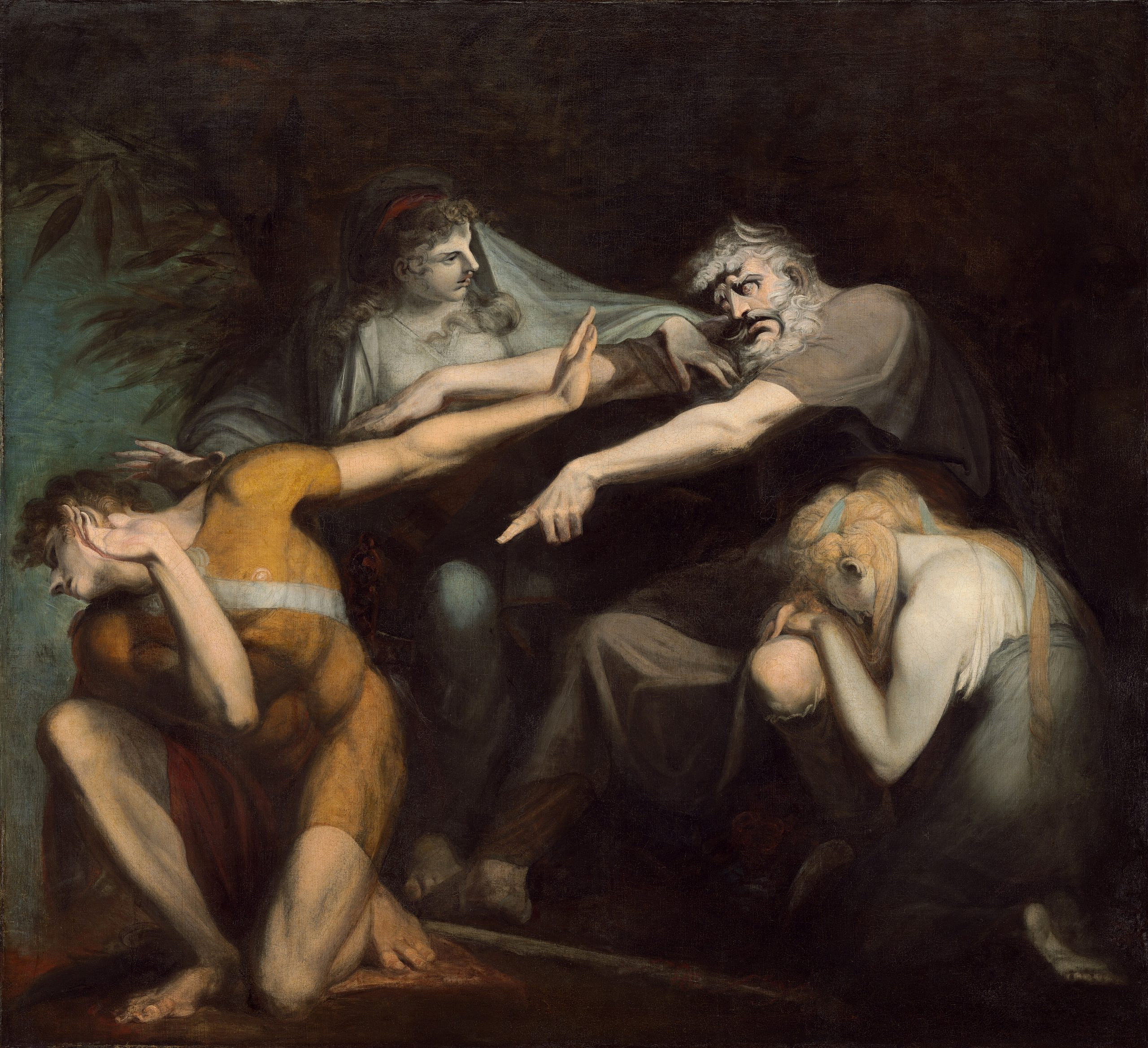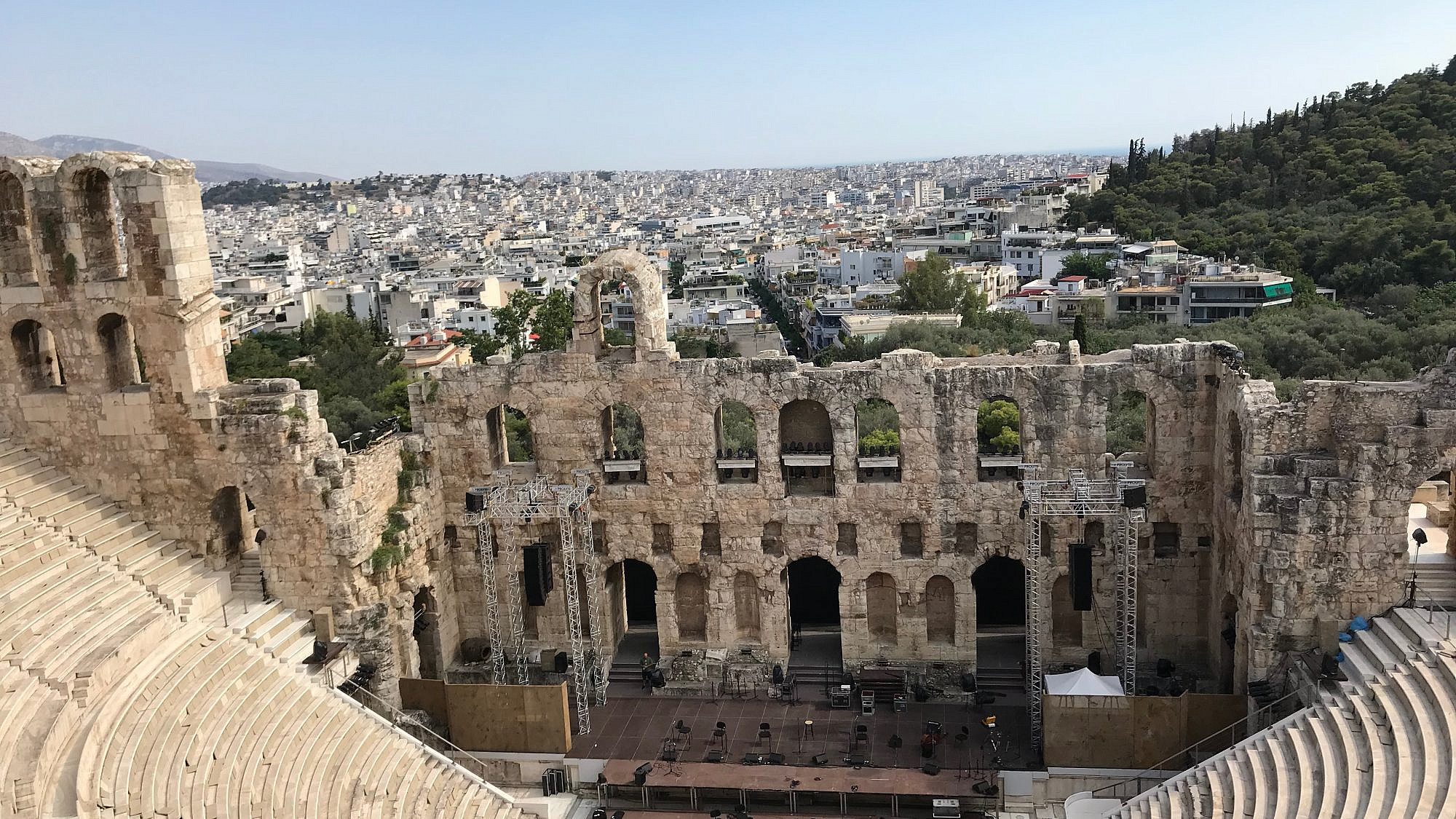All the rabbinic world was not a stage, and all the halachic scholars were merely players in it telling obedient Jews to avoid the theater at all costs.
In the sixth-century Midrashic text, Ruth Rabah, Naomi tells her daughter-in-law, who is destined to become a matriarch in the Davidic line: “My daughter, it is not the way of Jewish women to go to theaters and circuses of gentiles.” Other Midrashic texts contrast theaters and circuses (idling away) and synagogues and study halls, and the Talmud forbids going to theaters and circuses due to idolatrous practices therein.
But in all of those anti-drama admonitions, Courtney Friesen, associate professor and director of graduate studies for classics at the University of Arizona, sees both evidence that Jews were attending theaters—thus requiring rabbis to rail against it—and irony.
Just as rabbis and church leaders in the early Common Era issued bitter reproach after the fire-and-brimstone tongue-lashing of Greek drama, classical theater actually shaped ancient Judaism and Christianity in several important ways, according to Friesen, who is the author of the new book Playing Gods, Acting Heroes, and the Interaction between Judaism, Christianity, and Greek Drama in the Early Common Era.
“One of the suppositions driving my work has been that the vehemence of Jewish and Christian leaders against theater attendance points to the strong appeal that it held for many folks in their communities,” Friesen told JNS.
Evidence in literature and inscriptions of Jewish and Christian involvement in the theater can corroborate those observations, according to Friesen. Still, scholars are left to speculate about whether the dearth of records of Jewish productions of biblical dramas indicates that Jews didn’t write and act in plays or whether they have been lost to ravages of time, including exiles and persecution.
Friesen notes that a Jewish dramatist named Ezekiel who lived in Alexandria, perhaps 100 years before the Common Era, created a tragedy about the Exodus story. “We can’t be certain whether it was intended for actual performance, and if so in what venue,” Friesen said.
One of the scholar’s arguments in the book is that even as rabbis and church leaders scolded their flocks for going to the theater, Jewish and Christian practices were shaped by the theater. For example, synagogue and church layouts mirrored designs of Greek theaters, with the “audience” or worshippers surrounding the central “stage” where clergy delivered sermonic “performances.”
“It is always difficult for us to know what worshippers in synagogues or churches might have perceived they were doing, and in particular whether many of them were aware of similarities to what occurred in a theater,” Friesen told JNS.
“The venues were of course very different, and their respective religious leaders were often very explicit in their rejection of ‘pagan’ modes of entertainment,” he said. “But given the ideological resistance to theater by some Jewish and Christian authorities, it is all the more striking when they appropriate its forms, themes or language.”
The latter was done “explicitly” at times; on other occasions, it was “more subtle and indirect,” according to Friesen. (In one instance in the book, even as ecclesiastical leaders shuttered an Athens theater, they moved seats for dignitaries up to the Acropolis for use as ecclesiastical chairs in a church.)

‘A common humanity’
Friesen’s book addresses Christianity more than Judaism, in part because there is much more historical record of the former.
“Ancient responses to Greek drama are best attested in Greek and Roman sources, and Christian texts are more substantial and continuous in Greek and Latin,” he said.
But Ezekiel’s Exodus play—modeled particularly on Euripides—is both by a Jewish author and the “most complete Greek tragedy to survive from any Hellenistic playwright,” beyond the fifth century BCE, he noted. Friesen’s book also addresses the Jewish philosopher Philo of Alexandria, who was born 10 or 15 years before the Common Era and died in the year 45 or 50, extensively.
“He was well-read in Greek plays and even claims to have attended them,” Friesen said. “In many ways, however, his cultural and intellectual influences were stronger in Christianity than they were in later periods of Judaism.”
Josephus, the Jewish military leader and historian who lived from 37 or 38 to the year 100, recorded that Jerusalem Jews “opposed the theater complex under Herod because of the religious images that surrounded it, among other things,” Friesen told JNS.
“Theaters were themselves normally situated within sacred precincts, and plays were staged amidst religious ceremonies in honor of Greek and Roman deities,” he said. “So, there was an immediate barrier to participation.”
Central to Friesen’s scholarship and teaching “is to explore cultural interactions across the religious traditions and ethnicities that have divided people through history,” he said.
“Greek tragedy is a unique expression of a particular place and time, delimited by the languages and religions of the people who produced it. Nevertheless, it has been appropriated across history and now even around the globe for adaptation in new contexts,” he told JNS.
“One takeaway from my book is that while individuals have often engaged in rhetoric that constructs division and otherness, a common humanity can emerge despite such posturing,” he added. “One simply needs to pay attention and watch for it.”
‘Very little influence’
Lawrence Schiffman, global distinguished professor of Hebrew and Judaic studies at New York University, has not read Friesen’s book but is an expert on many of the areas upon which the book touches.
“There is no question that somewhat Hellenized Jews, in the Diaspora and even in the land of Israel, went to the theater,” he told JNS.
The late classical historian and Yeshiva University professor Louis Feldman documented the Hellenistic influences on Philo and Josephus extensively, “and this influence is certainly real,” Schiffman said. “There are also earlier studies of Hellenistic influence on Philo.”
But Schiffman urged “considerable caution” when approaching the question of the extent to which, if at all, those influences would have subsequently impacted the development of Judaism and the formation of the Mishnah and Talmud.
“This is because the Hellenistic authors, most prominently Philo, seem to have had almost no influence on later Judaism and seem not even to have been known in terms of their existence, except perhaps an occasional Karaite reference to Yehudah the Alexandrian, and we do not even know if this is Philo,” Schiffman told JNS.
“Josephus did somewhat better, but was not known, apparently, in the Talmudic period, only much later in the medieval period in the form of the Hebrew translation and adaptation of Yosippon,” he said. “But here the real Hellenistic stuff was omitted by the editor.” (Yosippon, often rendered Josippon, is a Hebrew text generally dated to the 10th century that purports to be authored by Josephus, who died in the year 100.)
“Put another way, Hellenistic Judaism had very little influence on the subsequent development of Judaism until it reentered in the form of philosophy in the Middle Ages,” Schiffman told JNS.
He also told JNS that what it was like on the ground in Jewish sacred spaces of the time represents a historical blind spot.
“We have insufficient knowledge of what went on in Hellenistic synagogues,” he said.


























